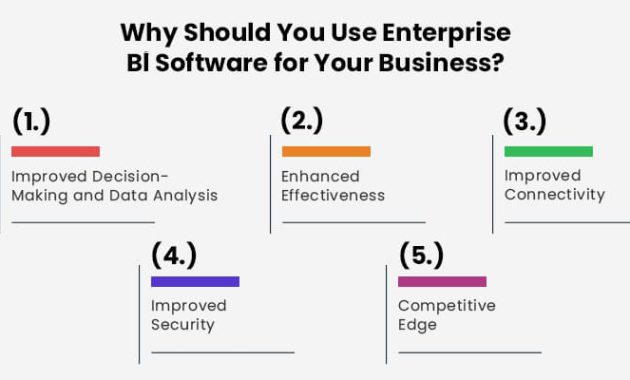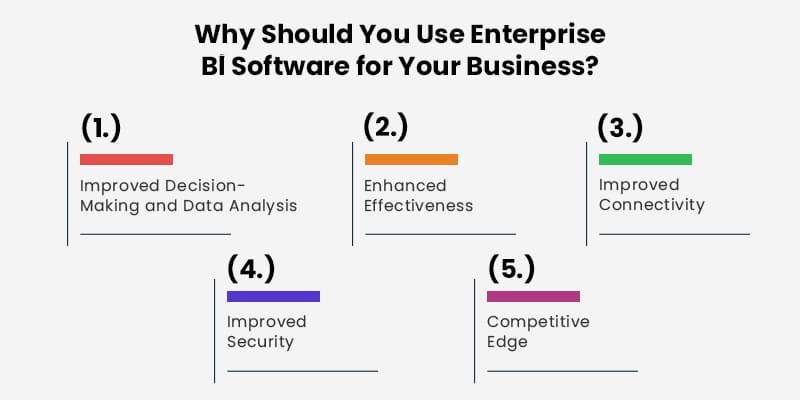
How Business Intelligence Software Supports Growth Plans: A Strategic Guide
In today’s fast-paced business environment, strategic planning and data-driven decision-making are no longer optional; they are essential. Companies seeking to expand and achieve sustainable growth must harness the power of data. This is where Business Intelligence (BI) software becomes a crucial asset. This guide explores how business intelligence software supports growth plans, providing a comprehensive overview of its benefits and practical applications.
Understanding Business Intelligence Software
Business Intelligence software refers to the technologies, applications, and practices used to collect, integrate, analyze, and present business information. The goal is to support better decision-making. BI tools transform raw data into actionable insights, enabling businesses to understand trends, identify opportunities, and mitigate risks. These tools can range from simple dashboards to complex analytical platforms.
Key Features and Capabilities of BI Software
Effective BI software offers a suite of features designed to empower businesses. These capabilities are critical for supporting growth plans:
- Data Integration: BI software can connect to diverse data sources. This includes databases, spreadsheets, cloud services, and more.
- Data Visualization: It presents data in easy-to-understand formats. This includes charts, graphs, and interactive dashboards.
- Reporting and Analytics: The software generates reports and performs advanced analytics. This provides insights into performance and trends.
- Data Mining: BI tools uncover hidden patterns and correlations. This helps to predict future outcomes.
- Performance Monitoring: It tracks key performance indicators (KPIs). This allows for real-time monitoring of business performance.
How BI Software Fuels Growth Plans
BI software plays a pivotal role in supporting growth plans. It does this by providing actionable insights and enabling strategic decision-making. Here’s how:
Improved Decision-Making
BI software provides data-driven insights. This enables businesses to make informed decisions. It moves the focus away from guesswork. Businesses can base decisions on facts and trends. This leads to better outcomes. BI software empowers companies to make sound choices. It also helps to avoid costly mistakes.
Enhanced Operational Efficiency
BI software identifies operational inefficiencies. It allows for optimization of processes. By analyzing data, businesses can find areas for improvement. This leads to cost savings and increased productivity. Automation becomes easier with data-driven insights. The software supports streamlining workflows. This improves overall efficiency.
Better Customer Understanding
BI software analyzes customer data. This provides insights into customer behavior. Businesses can understand customer preferences and needs. This enables them to tailor products and services. This also improves customer satisfaction. BI helps companies build stronger customer relationships. Targeted marketing campaigns become more effective.
Identification of New Opportunities
BI software helps to uncover new market opportunities. It can analyze market trends and competitor data. This allows businesses to identify potential growth areas. BI helps businesses to stay ahead of the competition. It also supports innovation and expansion into new markets.
Effective Risk Management
BI software helps to identify and mitigate risks. It can analyze data to predict potential problems. This enables businesses to take proactive measures. This protects the company from negative impacts. BI software is a critical tool for ensuring business resilience.
Real-World Examples of BI Software in Action
Several companies have successfully used BI software to support their growth plans:
- Retail: Retailers use BI to analyze sales data and optimize inventory. This leads to increased sales and reduced costs. BI helps to personalize customer experiences.
- Healthcare: Healthcare providers use BI to improve patient care. They also optimize operational efficiency. BI supports better resource allocation and improved outcomes.
- Manufacturing: Manufacturers use BI to track production efficiency. They also optimize supply chains. This leads to reduced costs and improved product quality.
- Finance: Financial institutions use BI for fraud detection and risk management. They also analyze customer behavior. This leads to better decision-making.
Choosing the Right BI Software
Selecting the right BI software is crucial. Consider the following factors:
- Business Needs: Identify specific business goals and requirements.
- Scalability: Ensure the software can grow with the business.
- Ease of Use: Choose a user-friendly platform.
- Integration: Make sure it integrates with existing systems.
- Cost: Evaluate the total cost of ownership.
- Support: Look for reliable vendor support and training.
Implementing BI Software: Best Practices
Successful implementation of BI software requires careful planning:
- Define Objectives: Clearly outline business goals.
- Data Preparation: Ensure data quality and accuracy.
- User Training: Provide training to all users.
- Ongoing Monitoring: Continuously monitor and optimize the system.
- Iterative Approach: Start small and scale as needed.
The Future of BI Software and Growth Plans
The future of BI software is promising. Advancements in areas like artificial intelligence (AI) and machine learning (ML) will further enhance its capabilities. AI-powered BI tools will provide even deeper insights. They will automate tasks and improve decision-making. Businesses that embrace these technologies will be well-positioned for growth. This is because BI software is essential for any growth plan.
Conclusion
Business Intelligence software is a powerful tool for supporting growth plans. It provides data-driven insights that enable better decision-making. It also improves operational efficiency and enhances customer understanding. Businesses that implement BI software are better equipped for success. They can identify opportunities, mitigate risks, and achieve sustainable growth. As the business landscape evolves, BI software will continue to play a critical role. It will be a key driver of business growth and innovation. Investing in BI software is a strategic move. It is essential for any company seeking to thrive in today’s competitive environment. Understanding how business intelligence software supports growth plans is crucial for strategic success. [See also: How to Choose the Right BI Tool] and [See also: BI Software Implementation Best Practices] and [See also: The Role of Data Analytics in Business Growth].

